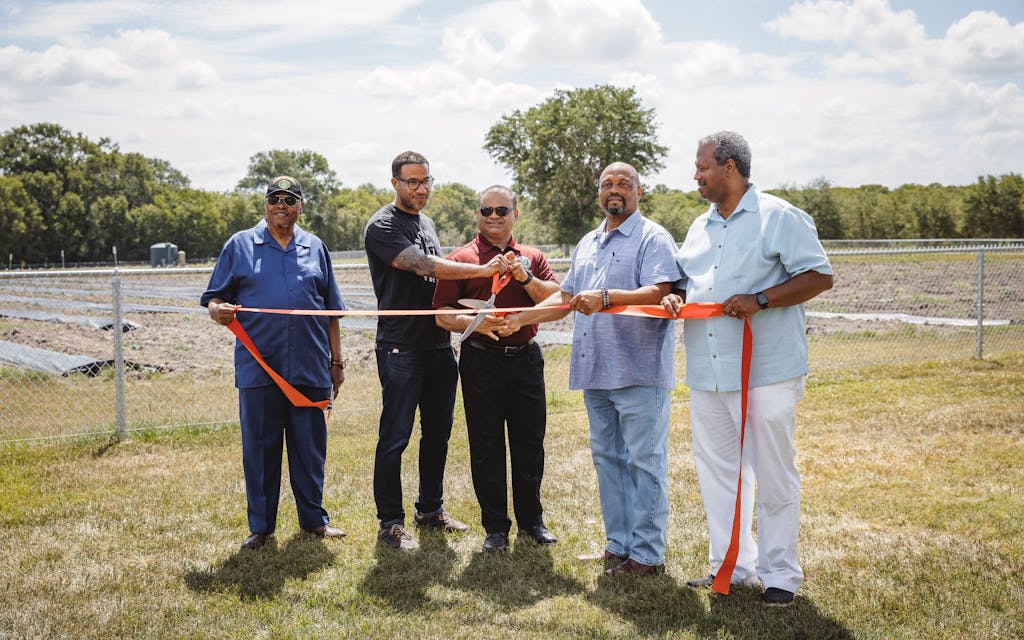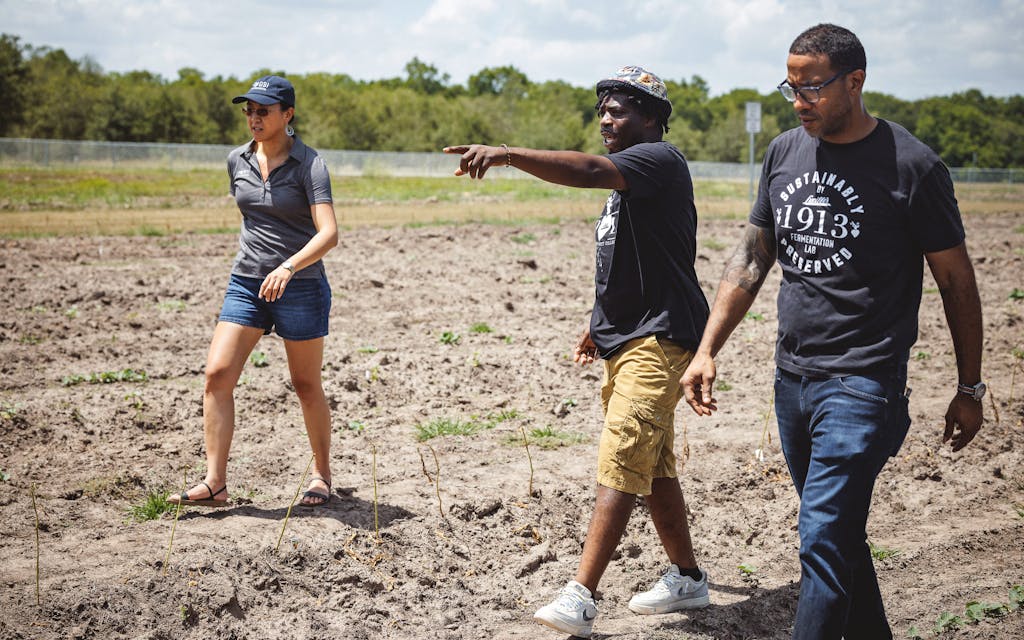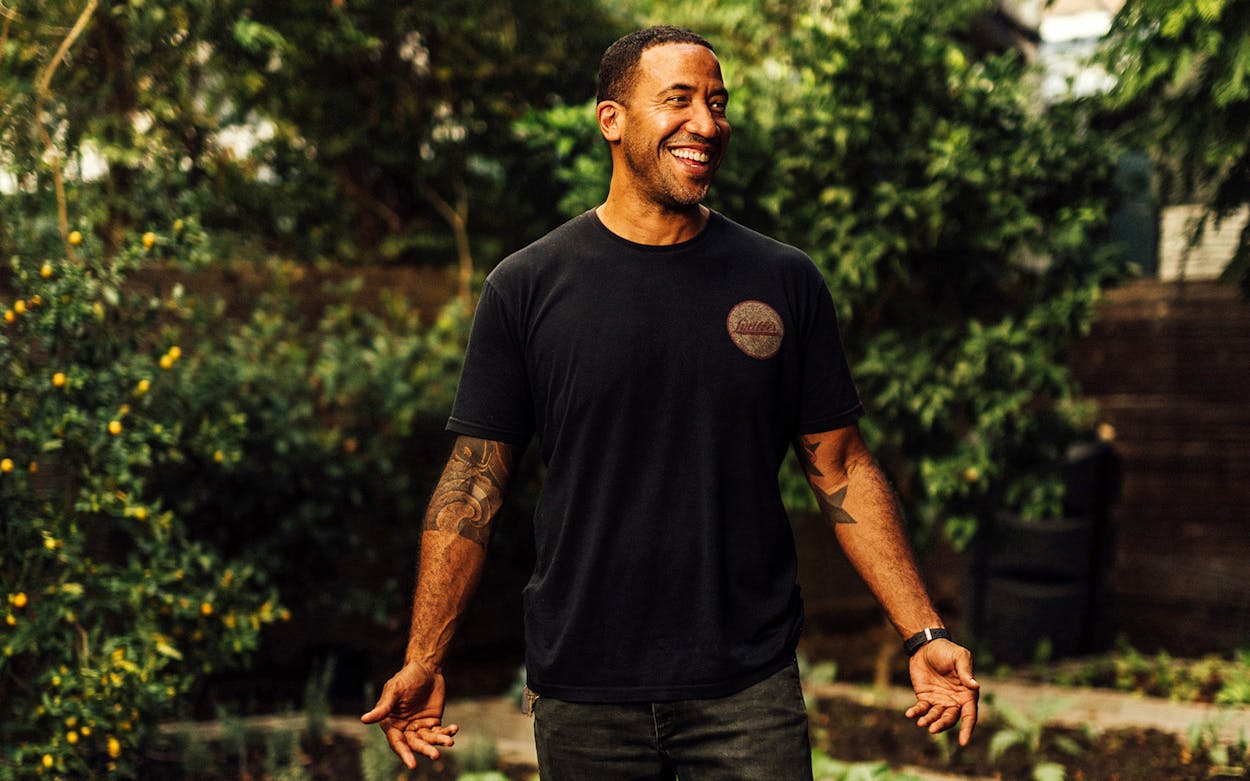This past Juneteenth weekend, chef Chris Williams stood in the summer heat at Bates Allen Park in Kendleton for a ribbon-cutting ceremony. A group of elected officials and community members gathered at the site of a garden. At the time, it was only a few acres of fresh soil, but during this month’s harvest, it’s filled with tomatoes, okra, cucumbers, and peas that will feed the residents of the historically Black town about an hour southwest of downtown Houston.
“To see this where we are right now, I’m damn near emotional,” Williams said after the event. “This impact is going to be deep.”
Williams, who was nominated for a James Beard Award this year, owns and operates Lucille’s, a Southern-inspired restaurant in the heart of Houston’s Museum District. Williams also heads a nonprofit, Lucille’s 1913, which began by providing meals to frontline workers during the height of the COVID-19 pandemic but now serves as a resource for forgotten places and people.
The chef and his nonprofit plan to hire, train, and pay the residents of Kendleton to grow food to sell to the community. To start, locals will be able to purchase the produce at a farmers’ market at least four times a year, but Williams hopes to eventually open a grocery store in the food desert, which is more than a dozen miles away from any fresh food source.
“We’re trying to rewrite this narrative and bring dignity back to hard work because that’s how you truly sustain yourself and your community,” Williams said.

Kendleton was once a thriving agricultural center. It was originally a plantation owned by William E. Kendall. In the 1860s, Kendall divided up his plantation into small farms, giving the land to freed slaves.
James Grant, who grew up in Kendleton, remembers helping raise cattle, rabbits, and chickens at just five years old. He recalls how farming brought the community together. Sometimes families would butcher multiple hogs and then split the meat amongst themselves to have for the winter.
Grant eventually went to Prairie View A&M University, got a degree in animal science, and came back and started raising his own cattle. He’s one of the few farmers left, and he says he misses those bonding moments he grew up with.
“When I came along, we lived off the land,” said Grant, 56, who was hired for the Kendleton farming project. “It was no McDonald’s, Burger King.”
Williams was unfamiliar with Kendleton until the office of Fort Bend County Judge KP George reached out in December 2020 about potentially teaming up with him and Lucille’s 1913.
Williams visited the area and met with Kendleton’s mayor, Darryl Humphrey. He learned that the closest grocery store is the H-E-B in Wharton, about a dozen miles away, leaving the town of a little over three hundred far from consistent access to fresh fruits and vegetables. He also learned that few job opportunities remain in Kendleton, with many residents seeking work elsewhere.
As he began thinking about what would benefit the town, he thought back to the original mission behind his nonprofit: to combat food insecurity. After initially serving meals to frontline workers, Lucille’s 1913 expanded to delivering meals to the elderly. Williams said his goal is to always cook and deliver meals for people’s specific taste buds.
“I know you. I know where you come from,” Williams said. “I know what your palate is. I know how you like to eat. [We deliver] meals and nutrition with dignity.”
Now, at the Kendleton farm, he is putting the mission into practice, growing fresh vegetables—like tomatoes, okra, cucumbers, and peas—that the residents like to eat and know how to cook.
Across the country, African Americans only account for about 1.4 percent of the 3.4 million agriculture producers, according to the 2017 U.S. Census of Agriculture. There are about 35,000 Black-operated farms out of the more than 2 million across the country. However, Texas has more African American producers than any other state.
“Farming is hard work, but it’s not respected the way it used to be,” Williams said. “You have to have access to land, you have to have access to the education, you have to have access to financial support because this is expensive and it’s risky.”

Jeremy Peaches, the farming manager for the Kendleton project, is aware of the challenges facing Black farmers, which he traces all the way back to emancipation. He notes that formerly enslaved people didn’t have equitable access to jobs, food, or training. He says the image of what a farmer looks like is skewed.
“We got to acknowledge that we need farmers, but a farmer is not a white, Republican man on a tractor,” Peaches, thirty, said. “It’s all of us. That’s what they brought us here for. It’s a part of us.”
Peaches, a Prairie View A&M graduate, is hoping he can attract a younger generation to farm in Kendleton. He currently spends about two days a week at the farm, observing and fertilizing as needed. The nonprofit hopes to employ at least sixteen people from Kendleton by spring and aims to eventually hire 10 percent of the town’s population. Peaches also plans to hold volunteer days to get more people interested.
“Now, we have an opportunity to show that the face of farming is Black,” Peaches said. “It is cool. We’re farming in Nikes and J’s. We’re having fun. This is showing we’re back.”
Robertine Jefferson, director of Lucille’s 1913, said the number of applications from Kendleton residents to work at the farm have been staggering. In April, she saw how much a local farm was needed when she attended an event at King-Kennedy Memorial Park in Kendleton. The nonprofit brought some small grocery boxes filled with cabbages, greens, carrots, onions, and sweet potatoes, and residents couldn’t get their hands on the boxes fast enough.
“Out there in Kendleton, the further you get away from Sugar Land, Richmond, and Rosenberg, the resources are few when it comes to fresh food,” Jefferson said. “There’s plenty of cattle, but if someone wants a plain, old fresh apple, they’re driving an excess of twenty miles.”
In addition to the land in Kendleton, Fort Bend County gave Lucille’s 1913 forty acres throughout the county to build farms. The nonprofit is also managing a garden in the Fifth Ward and one outside its headquarters at the Power Center in southwest Houston.
Williams is hopeful about the impact the farm will have in the community. He believes it’s important to bring Kendleton back to its roots.
“For one, we deserve it. We built this country. We built it through doing this. We were the farmhands. We weren’t paid. We weren’t compensated,” Williams said. “There’s so much work that needs to be done as far as rewriting the American narrative, especially as far as the Black experience is concerned.”






